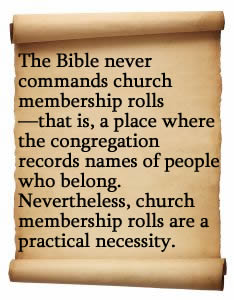Anyone who wishes to be married in the United States must first go to his county or municipal offices and request a marriage license. Certain statements are made under oath to obtain the license; a ceremony of some kind takes place; witnesses sign the license. Christians typically have their wedding ceremony at a church building or at least have a Christian  minister preside over the ceremony. But does any of this paperwork or ceremony really marry them? What marries them in the sight of God is the vows they make to one another to leave all others and to cleave to one another in covenant love for as long as they live. The marriage license and wedding ceremony are both formalities. A marriage license no more effects a marriage than a birth certificate begets or a death certificate kills. The paperwork is a formal record of what has occurred.
minister preside over the ceremony. But does any of this paperwork or ceremony really marry them? What marries them in the sight of God is the vows they make to one another to leave all others and to cleave to one another in covenant love for as long as they live. The marriage license and wedding ceremony are both formalities. A marriage license no more effects a marriage than a birth certificate begets or a death certificate kills. The paperwork is a formal record of what has occurred.
But just because the marriage license is a formality does not mean it’s dispensable. If the lady wishes to change her name on her social security card or bank accounts or passport, she’ll need the marriage license. If the couple wants to prove their right to file taxes jointly, the marriage license provides the foundation for that. Inheritance laws and property rights also require these papers for the property to change hands. If a man dies without a will, if his wife is to inherit his estate, she’ll need the marriage license to prove that they were married and the death certificate to prove he’s dead!
The term “formality” has negative connotations, but we need certain formalities if we’re going to give form to otherwise spiritual or abstract or hard-to-observe phenomena. To try to accomplish tasks without these formal elements in place can be cumbersome or ambiguous or open to charges of inconsistency or error.
A church membership roll is one such formality. The Bible never commands church membership rolls—that is, a place where the congregation records names of people who belong. Nevertheless, church membership rolls are a practical necessity. Many arguments in favor of having a church membership roll skim through various early church functions and events and ask, “How could this be done without formal membership?” Unfortunately, some who frame these arguments may be tempted to overstep their bounds and to proceed, “The early church must have had a membership roll, so a membership roll is a biblical pattern; therefore, we must have a church membership roll.” Somehow, the certainty level got ratcheted up in there—beyond biblical warrant, it seems.
Perhaps the following line of thinking is better. Christ left His church with certain tasks and responsibilities, and a certain amount of freedom as to how to accomplish those tasks and to handle those responsibilities. The freedom includes the freedom to select those formal mechanisms best suited to facilitate the work. The early church had this freedom, and it sure looks like they had notions of a church membership roll. But whatever they did, the pressing question for us is, “What shall we do?” What are the best mechanisms we can utilize in our tasks? When we look at what the church has to do in the world, a church membership roll emerges as a practical necessity for getting it done. For without this formality, the church is formless, hard to define, hard to manage.
The first, very general use of a church membership roll is formalizing the answer to the question, “Who is the church?” Of course, the true church includes that group of people for whom Christ died (Eph. 5:25), but we lack omniscience to see into God’s decree of election, so we need to examine the outward evidences of regeneration: baptism, a profession of faith, a walk consistent with the profession. Church membership reflects the opinion not just of one or two people about an individual’s profession of faith; rather, it is the church itself as an institution, giving credence to an individual’s profession of faith. For all those ministries in the church where personal salvation is a prerequisite, granting church membership ensures that it is not the whim of any one person to accept the testimony of salvation. For instance, no Sunday school superintendent needs—all by himself—to decide “yes” or “no” about a potential teacher’s profession of faith. That could lead to unhealthy or uncomfortable situations. The church as an institution bears that responsibility via the membership roll.
The church is called “the pillar and ground of the truth” (1 Tim. 3:15). The church has been commissioned with the task of teaching people to observe all that Christ commanded (Matt. 28:20). What is true, and what is not true? What did Christ command, and what did He not command? And so the second use of a church membership roll is to ensure that those involved in the church have agreed to a minimum-level doctrinal statement. (As an aside, congregations should take care not to abuse their God-given authority to supplant the authority of Scriptures; the pillar and ground of the truth must uphold most firmly of all sola scriptura, and an unnecessarily detailed doctrinal statement may undermine the more fundamental authority of the Word to each believer’s conscience.) Can we be reasonably assured that everyone in the congregation is on the same page, that they will promote and preserve the same doctrine? If the church as an institution is to preserve true doctrine generation after generation, church membership is a helpful mechanism.
Third, the church has a leadership and ministry structure laid down in Scripture, at least in outline. If we are to “obey them that have the rule over” us (Heb. 13:17), we had best know who it is that we obey. When the church chooses elders and deacons (Tit. 1:5; Acts 6:3), there must be a basic pool of people from whom to choose and a group of people with the authority to choose. Practically speaking, if a church is about to vote on a pastoral candidate, not just anyone can walk in off the street and help select him. The same would apply to examining, choosing, and holding missionary candidates accountable (cf., Acts 13:1–3). These are weighty matters. God’s people are choosing those who will keep watch over their souls or who will represent Christ in far-off regions. God’s people need opportunity to raise questions or concerns. In touchy matters like this, the church would do well to have a clear answer to the question, “Says who?”
Fourth, the church is to maintain discipline of conduct. Immorality cannot be tolerated (1 Cor. 5). To the church has been committed the keys of authority (Matt. 16:19), and part of that authority is to handle—as an institution—escalated matters of discipline among individual believers. Matthew 18 tells us, “And if he [the offending believer] shall neglect to hear them [two or three individuals], tell it unto the church [collectively]: but if he neglect to hear the church, let him be unto thee as an heathen man and a publican. Verily I say unto you, Whatsoever ye shall bind on earth shall be bound in heaven: and whatsoever ye shall loose on earth shall be loosed in heaven. Again I say unto you, That if two of you shall agree on earth as touching any thing that they shall ask, it shall be done for them of my Father which is in heaven. For where two or three are gathered together in my name, there am I in the midst of them” (vv. 17–20). This is the negative side of the first point above. Both the granting and the denial of membership are functions of church discipline, although we usually think of only the denial of membership as discipline. Both are grave responsibilities; the first is a delight, the second a grief. Formal revocation of church membership is designed to preserve the purity of the church and, we hope, to jar the offending party to his senses. The need for some formal membership arises here in two ways: first, who may be disciplined? A church cannot govern or hold accountable someone never submitted to the church in the first place. And second, who has the authority to discipline? Matthew 18 and 2 Corinthians 2:6 present a gathered body working in concert to exercise the discipline. In touchy situations like this, we don’t want awkward questions of who has a say and who does not. A church membership roll makes it clear.
A church membership roll doesn’t guarantee salvation. It doesn’t guarantee godliness. It doesn’t even guarantee a healthy functioning church. But it sure helps. It provides established, consistent standards and protocols so when the church must act, it can do so without pausing to consider who may act. As an expedient devised by believers over the years, it is only an expedient and may be dispensed with. But why? Surely before we dispensed with it, we would want a clear idea of how we would run the church without it. Would we replace it with some better expedient? Possibly. We should remain open to a better mechanism if one comes along. But if a better mechanism came along, would it differ substantially from what is already in place? Unlikely. The practical necessity that gave rise to a membership roll has remained substantially the same, and whatever mechanism we devise to meet this practical necessity will always be shaped by the necessity.
 Michael Osborne received a B.A. in Bible and an M.A. in Church History from Bob Jones University (Greenville, SC). He co-authored the teacher’s editions of two BJU Press high school Bible comparative religions textbooks What Is Truth? and Who Is This Jesus?; and contributed essays to the appendix of The Dark Side of the Internet. He lives with his wife, Becky, and his infant daughter, Felicity, in Omaha, Nebraska, where they are active members at Good Shepherd Baptist Church. Mike plans to pursue a further degree in apologetics.
Michael Osborne received a B.A. in Bible and an M.A. in Church History from Bob Jones University (Greenville, SC). He co-authored the teacher’s editions of two BJU Press high school Bible comparative religions textbooks What Is Truth? and Who Is This Jesus?; and contributed essays to the appendix of The Dark Side of the Internet. He lives with his wife, Becky, and his infant daughter, Felicity, in Omaha, Nebraska, where they are active members at Good Shepherd Baptist Church. Mike plans to pursue a further degree in apologetics.
No comments:
Post a Comment